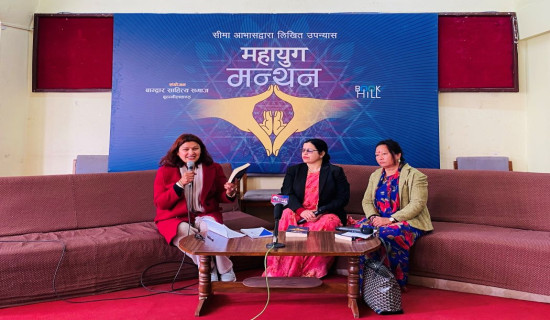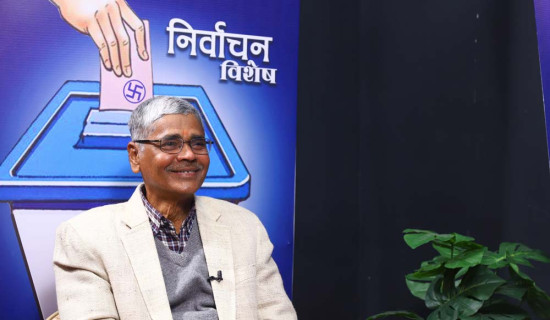- Wednesday, 4 February 2026
Sharma's Foray In Floral Waste To Empower Women
Not many people know Shushma Sharma (Wosti), let alone her innovative enterprise to change the lives of scores of women, but this dynamic woman who resigned her lucrative job at NMB Bank to quietly steer a socio-economic campaign deserves to be known far and wide. An ex-banker, Shushma, established a company named Phool Prasad in 2018, intending to transform the flowers offered to gods into chemical-free incense. "By recycling discarded flowers, we convert people's offerings into incense, allowing them to be used again for the same purpose. This venture, on the one hand, contributes to solid waste management and cleaning heritage sites, and on the other hand, creates employment opportunities for women," said Sharma.
Sharma worked for 14 years in NMB Bank and briefly worked in Dabur Nepal and IT Park. With almost 25 years of work experience, she ventured into a small enterprise with Phool Prasad, an incense-producing company, and Himalayan Tranquilly, an export company. She also runs an NGO named Women Can, which works to empower women through capacity building. "Those women who are staying at home could be brought to entrepreneurship, and those who already are should be scaled up. I am advocating for women's empowerment and financial independence, so I have made significant efforts to create job opportunities for women, "said Sharma.
Phool Prasad strives to create a positive impact on the environment, society, and economy. Sharma's small enterprise, significantly contributes to the economy by fostering innovation, creating jobs, and supporting underprivileged women. By transforming waste flowers into chemical-free incense, the enterprise not only addresses solid waste management but also provides employment opportunities, particularly for women, making them financially independent. This initiative exemplifies how small businesses can drive positive change.
During her travel abroad with Qatar Airways, she encountered women heading to Gulf countries for employment at minimal wages, leaving their children in the care of others. These women, lacking education and proper training, are among the most vulnerable groups. They often face violence while working as domestic help abroad. She felt that if these women were made able to earn something in their own country, they wouldn't need to migrate for work. Through the NGO Women Can, she provides income-generating skills to empower women and make them economically capable. Initially, she offers incense-making training through the municipality and local wards. Afterwards, women collect raw materials from the factory and produce incense in their homes. They are paid based on the quantity of incense they make, earning between Rs. 5000 and Rs. 20,000 monthly, which has significantly improved their lives.
"Economic empowerment is crucial for advancing women's rights and promoting gender equality. When women have access to economic resources and are financially independent, they gain better decision-making power, greater control over their lives, improve well-being, and can contribute more effectively to their families and communities," said Sharma.
Phool Prasad operates its vehicles to collect discarded flowers from temple areas, following their offering to the gods. Once collected, these flowers are transported to the factory in Kapan 11, where they undergo a meticulous process. The flowers are segregated, cleaned, dried, and then crushed. Essential oils and camphor are infused into the crushed flowers to prepare the raw materials. Women then use these raw materials to produce various types of incense, continuing the cycle of repurposing and employment.
Sharma said that they are experimenting with making Tibetan incense using Dhupi and Sonapati, which are mostly used during meditation. All the products of Phool Prasad are eco-friendly, no artificial fragrance is used, and all products are handmade. Phool Prasad's approach of recycling flowers into incense is a novel concept, where people repeat already tried concepts without proper research and market analyses. It’s the reason why many business ventures fail in Nepal. Sharma says that there is a lot of possibility in Nepal, all we need is sustainable ideas, dedication, hard work, and a knowledge of how to explore the market. You have to create a market yourself, said Sharma. The primary market of her products is overseas; she says she sells her products in America and prominent European countries and also gives marketing training to wannabe entrepreneurs.
Sharma says we often overlook the packaging of the products. Although we have the best quality tea to export, lack of good packaging and marketing, other less quality tea outweighs our tea. Packaging is extremely important to encourage customers to buy the products. So, Phool Prasad has paid meticulous attention to packaging, the packaging looks impressive, although the packaging adds to the production cost. They also make gift boxes using Nepali handmade paper.
After she opened Phool Prasad in 2018, the COVID epidemic brought everything to a standstill. Both production, sale, and export came to a halt. Instead of being disappointed and shutting down the business, she devoted her time and expertise to research and development. She did thorough research on what kinds of products the overseas market demands, and she worked on enhancing marketing techniques. She did experiments with the aromas and what types of products attract her target customers. She experimented with the export of DDC ghee to the Japanese market, but this venture did not work, as she could not meet the demand. Sharma believes in hard work and persistence and says success is not final and failure is not fatal. It’s the courage to continue that count. Although Sharma started this venture almost at the age of 50, she has been able to leave her mark on society by contributing to the economic empowerment of those women who are most vulnerable. At the same time, it has set a trend that if you have an idea, a willingness to do hard work, and a capacity to understand the demand of the market, then it's never too late to start a business and make it successful. She says that we need to explore digital platforms to sell and do marketing of our goods; if we don’t go hand in hand with technology, we won't be able to sustain.
The government of Nepal gives a 15 per cent tax exemption for enterprises with more than 50 per cent women employees and collateral-free loans at subsidised interest rates to create a conducive environment for women entrepreneurs. The government exempts 15 per cent VAT in exports. As per the provision of the Income Tax Act, 100 per cent tax will be exempted for income generated by microindustries for seven years from the date of commencement of the business transaction. Where such an industry is owned by women, there shall be tax exemption for another three years thereafter. While the government has made some efforts, it still needs to formulate policies that support a favourable environment for women entrepreneurs to succeed. In Nepal, women entrepreneurs often feel disheartened by the lack of adequate policy support and the complexities of bureaucratic processes.
(Adhikari is a journalist at The Rising Nepal.)
















